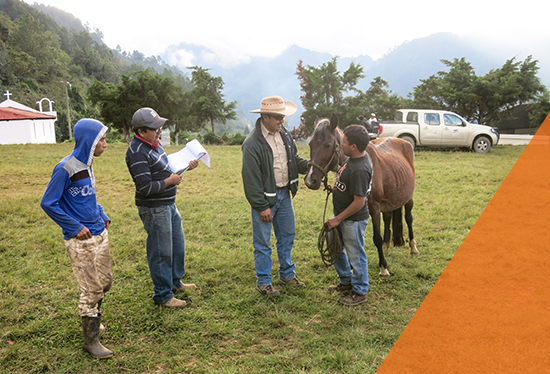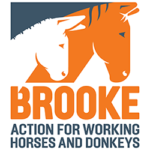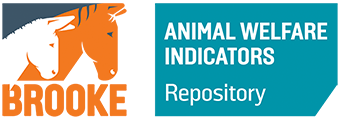
Brooke’s animal welfare indicators are used worldwide to assess working equids
We are now sharing these resources to enable others to learn from our experience and utilise the indicators to measure and improve equine welfare around the world.
There is no cost to register and gain access to the material on this site – just log in and start downloading:
What are animal welfare indicators?
Animal welfare indicators are scientific measurements of aspects that contribute to an animal’s overall welfare state. They may be ‘animal-based’ and measured directly from the animal e.g. nasal discharge, or ‘resource-based’ and measured from inputs provided to animals or from their surrounding environment e.g. air quality. The materials on this site are focussed on animal-based indicators as these provide the most reliable reflection of the animal’s actual welfare state.
Welfare assessment is the process of appraising the welfare state of individual animals or groups of animals. The materials on this site have been developed for use at the individual animal level. At Brooke, animals are assessed individually then data are collated and analysed at a group level in order to identify welfare issues in different populations of working equids.
Using animal welfare indicators in this way helps us to understand the animals’ needs, informs priorities for welfare improvement activities, and allows us to monitor effectiveness and evaluate the impact of our work.
"Use of animal welfare indicators helps us to generate strong evidence-based ‘advocacy asks’ to improve the welfare gaps."
Naeem Abbas Shah, Advocacy Manager, Brooke Pakistan
We hope that sharing Brooke’s Animal Welfare Indicators Repository will enable others to learn from our experience and utilise these resources to measure and improve equine welfare around the world.
Although these indicators have been developed for use with working equids, there is also scope to adapt them for application to alternative contexts and species.
Who is this site for?
- Equine welfare practitioners wishing to adopt evidence-based practice
- Academics and animal scientists assessing welfare within a research context
- Development professionals who encounter or utilise equids during field-work
- Animal health practitioners and veterinarians treating equids
- Policy-makers requiring means of quantifying the need for and impact of welfare-related regulation
- Advocacy and campaigns officers whose requests will be strengthened by welfare data
- Emergency responders dealing with equine populations
- Students of animal welfare assessment, equine science or animal welfare science
"Animal welfare indicators can reveal to us many bad practices on observed animals. This tells us the right intervention to do and the right advice to provide to owners to prevent recurrent health and welfare issues."
Dr Maïmouna Ndiaye, Animal Welfare Officer, Brooke West Africa
Background to welfare assessment at Brooke
Brooke is an international animal welfare charity, founded in 1934, whose mission is to transform the lives of vulnerable working horses, donkeys and mules around the world. Achieving this mission requires a detailed understanding of the welfare issues affecting these animals.
An important means of gaining this insight is through assessing the welfare of the animals directly, using relevant and standardised animal welfare indicators, to generate valuable data that can be used to inform many aspects of welfare improvement activities. Now we’d like to help others to do the same.

Find out more about our work supporting health and welfare of working equids and sign up for updates.
This work has been funded by Brooke supporters and is offered to you as a free resource.
If you’d like to support us, please consider making a donation.
